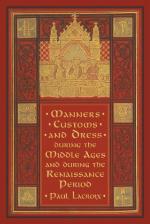However it came about, it is certain that although during the tenth century feudal power was almost supreme in Europe, as early as the twelfth century the municipal system had gained great weight, and was constantly progressing until the policy of the kingdom became developed on a more and more extended basis, so that it was then necessary for it to give up its primitive nature, and to participate in the great movement of consolidisation and national unity. In this way the position of the large towns in the state relatively lost their individual position, and became somewhat analogous, as compared with the kingdom at large, to that formerly held by bourgeois in the cities. Friendly ties arose between provinces; and distinct and rival interests were effaced by the general aspiration towards common objects. The towns were admitted to the states general, and the citizens of various regions mixed as representatives of the Tiers Etat. Three orders thus met, who were destined to struggle for predominance in the future.
We must call attention to the fact that, as M. Henri Martin says, by an apparent contradiction, the fall of the Communes declared itself in inverse ratio to the progress of the Tiers Etat. By degrees, as the government became more settled from the great fiefs being absorbed by the Crown, and as parliament and other courts of appeal which emanated from the middle class extended their high judiciary and military authority, so the central power, organized under monarchical form, must necessarily have been less disposed to tolerate the local independence of the Communes. The State replaced the Commune for everything concerning justice, war, and administration. No doubt some valuable privileges were lost; but that was only an accidental circumstance, for a great social revolution was produced, which cleared off at once all the relics of the old age; and when the work of reconstruction terminated, homage was rendered to the venerable name of “Commune,” which became uniformly applied to all towns, boroughs, or villages into which the new spirit of the same municipal system was infused.
[Illustration: Fig. 40.—Various Arms of the Fifteenth Century.]
Private Life in the Castles, the Towns, and the Rural Districts.
The Merovingian Castles.—Pastimes of the Nobles; Hunting, War.—Domestic Arrangements.—Private Life of Charlemagne.—Domestic Habits under the Carlovingians.—Influence of Chivalry.—Simplicity of the Court of Philip Angustus not imitated by his Successors.—Princely Life of the Fifteenth Century.—The bringing up of Latour Landry, a Noble of Anjou.—Varlets, Pages, Esquires, Maids of Honour.—Opulence of the Bourgeoisie.—“Le Menagier de Paris.”—Ancient Dwellings.—State of Rustics at various Periods.—“Rustic Sayings,” by Noel du Fail.
Augustin Thierry, taking Gregory of Tours, the Merovingian Herodotus, as an authority, thus describes a royal domain under the first royal dynasty of France:—




